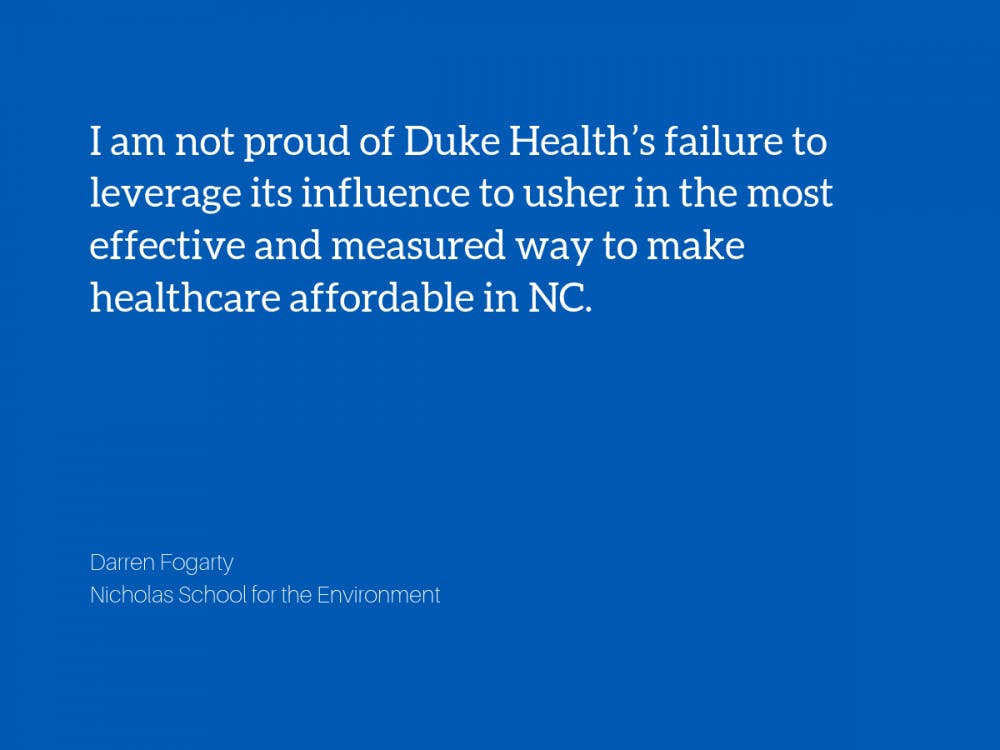On September 16, the Chronicle ran a front-page article extolling Duke’s progressive work on improving the NC healthcare payment system. The article raises good points but misses the mark on evaluating the state of public and private healthcare in NC.
We are in full agreement that fee-for-service payment models for healthcare providers were poorly designed and have resulted in skyrocketing healthcare expenses. Any number of solutions could be an improvement. The American health insurance and healthcare situations are just that dismal. Still, judging a replacement for fee-for-service based purely on “What’s better?” is falling victim to the tyranny of low expectations. Instead, we should be asking: “What solution is most effective?”
Value-based payment is neither a sustainable solution nor a meaningful one. Insurance carriers and providers are vague and inconsistent on what exactly “value-based” payment entails. Sometimes these definitions can even come at the patient’s expense. Under value-based criteria, doctors and hospitals may be penalized for readmitting patients or caring for patients with unpredictable health conditions. In theory, value-based payment is supposed to ensure that quality work receives commensurate compensation, and vice-versa. In reality, large insurance carriers and increasingly consolidated hospital systems are the ones who set the guidelines for what constitutes so-called “value-based” payment/care.
Meanwhile, the debate about how NC providers should be paid is nested firmly within a larger conversation that played out earlier this year—of which The Chronicle’s article made no mention. NC Treasurer Dale Fowell attempted to follow Montana’s successful example by creating a reference-based pricing payment model (instead of a value-based one) for the state health plan, which covers 727,000 North Carolinians. Such a strategy pays providers based off a percentage of Medicare prices, which were specifically “set . . . [to compensate] providers fairly based on their costs of doing business and the services they provide.”
Sadly, Fowell’s plan to inject cost accountability back into our state’s health plan failed miserably, in large part because NC hospitals banded together, decried the rates as arbitrary, and refused to sign onto the contract. Translation: NC hospitals decided it was worth holding state employees’ healthcare plans hostage to not have to accept 180-196% of what Medicare regularly reimburses providers for the same exact services.
I interviewed Charlotte-based benefits advisor, David Contorno, to ask him what he thought of value-based payment and the role of hospitals in determining healthcare prices. He recalled two conversations with health insurance representatives that illustrate my points.
The first occurred at an industry event in Phoenix, AZ. There, an insurance carrier representative bragged onstage about how value-based payment had returned $14M to the hospital. Contorno raised his hand and asked, “Why isn’t that money being returned to employers or patients themselves? Also, what value or quality metrics were used to determine your achievements?” He didn’t get an answer.
In the second anecdote, Contorno encountered another insurance carrier representative who told him her company was moving to value-based payment. She cited this as a specific reason for why they wouldn’t be supporting reference-based pricing. “Insurance companies and hospitals should never be the ones to decide value,” reflected Contorno. “Only doctors and patients can determine the quality and worth of the treatment.”
When I evaluate the state of healthcare in NC, I discount the marketing language of Duke Health and UNC Health Care (who utterly dominate the scene in our state). I discount the flowery brochures and quotable statistics from Blue Cross Blue Shield about how they’re “transforming healthcare.” If these enormous organizations were truly interested in lowering the healthcare prices that are bankrupting Americans, they would be willing to discard a nebulously defined term like “value-based” in favor of a concrete pricing methodology like Medicare-based reference pricing. At every turn, however, we see that hospitals are not only unenthusiastic, but unwilling to do so.
Duke Health is one of the greatest research and healthcare delivery institutions in the world. I am proud that, as Durham’s largest employer, it provides careers and a sense of meaning to 30,000 people who are pioneering medical breakthroughs and life-changing care. I am even more proud of the healing work it has done for countless NC families, some of whom I know and love.
I am not proud of Duke Health’s failure to leverage its influence to usher in the most effective and measured way to make healthcare affordable in NC. It will need to do more to earn its position as a “forerunner” in changing healthcare.
Darren Fogarty is an MEM student at the Nicholas School. He also researches and writes on healthcare, employee benefits and health insurance economics for Wincline.
Get The Chronicle straight to your inbox
Signup for our weekly newsletter. Cancel at any time.

